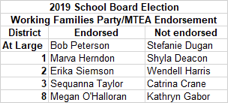None of this will matter unless the people of Milwaukee stop electing union-supported liberals to this board. They need people who care more about educating kids than they do about the system, buildings, or even teachers.
Enough is enough.
That is the message Milwaukee activist Dr. Tamika Johnson and other concerned citizens had for the Milwaukee Public School Board on Wednesday. The group calls itself the Recall MPS School Board Collaborative.
[…]
According to the group, “MPS’ gross financial mismanagement, irresponsible and unresponsive leadership, and inadequate governance by the elected MPS School Board Directors” led them to launch a recall of selected members.
Those members are Board President Marva Herndon, Board Vice President Jilly Gokalgandhi, Erica Siemsen, and Missy Zomber. The group says those four members have not been transparent over the last few years and have deceived the public.

